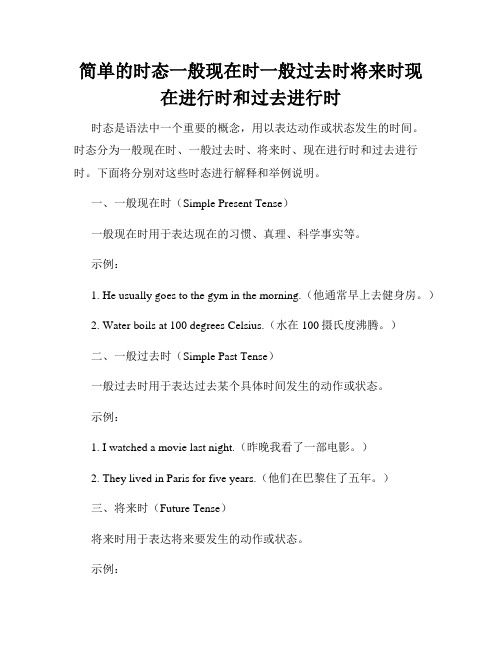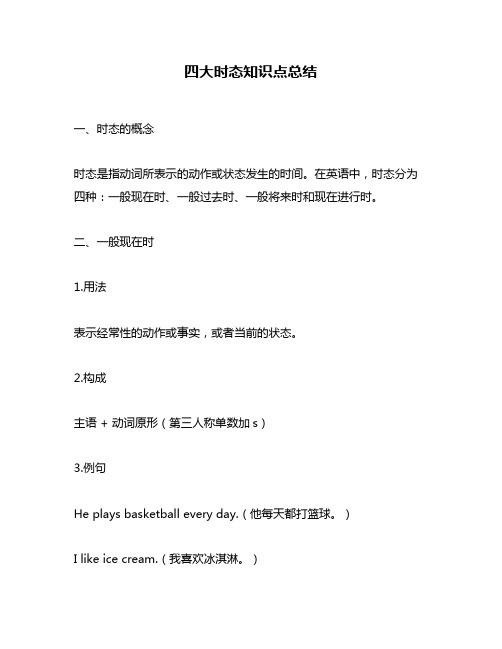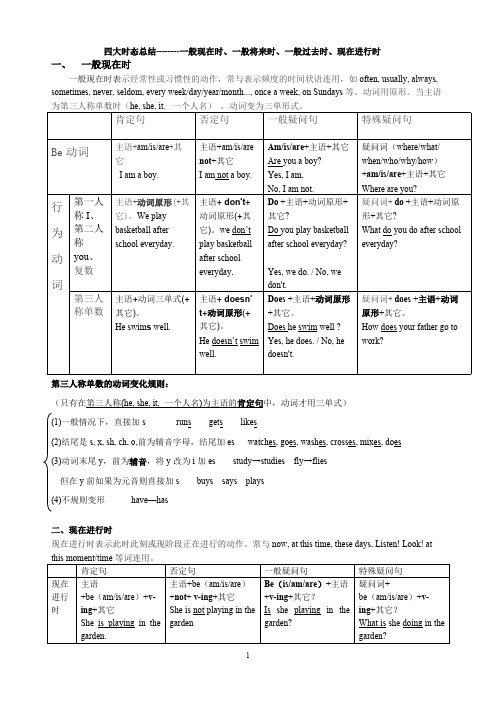一般现在时、一般过去时、一般将来时、现在进行时
一般现在时-现在进行时-一般过去时-过去进行时-一般将来---改

2) 表示有迹象表明即将发生的动作。 Look at the clouds in the sky, it’s going to rain . 瞧天上的云, 就要下于了。 3) go , come ,leave等表示位置移动的动词 用进行时表示将来。 He is leaving for Beijing next week . 他下星期将去北京。 I’m going to the teachers’ office. 我打算去老师的办公室。
left 7.They ____(leave) for England two days ago. did you_____(see) see 8.When ____ the film last week?
9.Who helped _______(help) the old man? John did ____(do).
特殊疑问句 疑问词+shall/will+主语+ +动词原形+ (其它成分)? Shall用于第一人称。 Will用于各种人称。 口语中常用will代替shall 。 一般将来时的用法: 1.表示自然的趋势, 如年龄、 气象报告的客 观性预测等。 1)I shall be sixteen years old next month. 下个月我将十六岁。
特殊疑问句: 疑问词+do +主语+动词原形+其它成分)? When do you usually go to bed? 2. 主语为第三人称单数 疑问词+does+主语 +动词原形+(其它成 分)?Where does Jim do his homework on weekdays ? 注动词的第三人称的变化跟名词变复数相同。 如: start-----starts , go-----goes ,do –does study------studies , have ----has
简单的时态一般现在时一般过去时将来时现在进行时和过去进行时

简单的时态一般现在时一般过去时将来时现在进行时和过去进行时时态是语法中一个重要的概念,用以表达动作或状态发生的时间。
时态分为一般现在时、一般过去时、将来时、现在进行时和过去进行时。
下面将分别对这些时态进行解释和举例说明。
一、一般现在时(Simple Present Tense)一般现在时用于表达现在的习惯、真理、科学事实等。
示例:1. He usually goes to the gym in the morning.(他通常早上去健身房。
)2. Water boils at 100 degrees Celsius.(水在100摄氏度沸腾。
)二、一般过去时(Simple Past Tense)一般过去时用于表达过去某个具体时间发生的动作或状态。
示例:1. I watched a movie last night.(昨晚我看了一部电影。
)2. They lived in Paris for five years.(他们在巴黎住了五年。
)三、将来时(Future Tense)将来时用于表达将来要发生的动作或状态。
示例:1. We will have a meeting tomorrow.(我们明天要开会。
)2. She is going to travel to Japan next month.(她下个月将要去日本旅行。
)四、现在进行时(Present Continuous Tense)现在进行时用于表达正在进行的动作。
示例:1. They are watching TV at the moment.(他们此刻正在看电视。
)2. She is studying for her exam right now.(她正在复习考试。
)五、过去进行时(Past Continuous Tense)过去进行时用于表达过去某一时刻正在进行的动作。
示例:1. I was reading a book when she called.(她给我打电话的时候,我正在看书。
(完整版)一般现在时、一般过去时、一般将来时、现在进行时

初中语法一般现在时、一般过去时、一般将来时、现在进行时四种时态的区别名称定义时间动词形式时间词always、sometimes、usually、1、动词原形often、every表示经常性或习2、第三人称单一般现在时平时、经常惯性的动作数morning、动词后-s/esevery week、twice a week等等now、rightnow、表示此时此刻或at theam/is/are+动词现在进行时现阶段正在进行正在进行ingmoment、的动作look、listen等in the future、1、will/shall+动next词原形表示将来发生的week/month、一般将来时即将、计划2、am/is/are事tomorrow、+going to+动词in two weeks原形等等ago、yesterday、表示过去某一时1、V-ed(规则last week/候或某一段时间过去(与现动词)一般过去时night、所发生的事情或在无关的)2、不规则动词just now、存在的状态变化once upon atime等注意:1、一般现在时——第三人称单数的动词变化规则:1)大多数动词在词尾加“S”如:stop-______; make-______read-______; play-______2)以辅音字母加“y”结尾的,要先将“y”变为“i”,然后在加“es”如:fly-______;carry-______study-______; worry-______3)以“s, x, ch, sh”结尾的,在词尾加“es”如:teach-______;watch-______4)以“o”结尾的动词,加“es”如:go-______do-______2、现在进行时——动词ing形式的变化规则1.一般动词直接在词尾+ing例:read→______(读)talk→______(交谈)sing→______(唱歌)2.以不发音e结尾的动词,先去e再加ing例:like→______喜欢write→______写skate→______(滑冰)3.以重读闭音节结尾且末尾只有一个辅音字母的动词,双写末尾字母,再加ing例:stop→______(停止)get→______(得到)4.少数几个以ie结尾的动词,变ie为f再加ing。
四大时态知识点总结

四大时态知识点总结一、时态的概念时态是指动词所表示的动作或状态发生的时间。
在英语中,时态分为四种:一般现在时、一般过去时、一般将来时和现在进行时。
二、一般现在时1.用法表示经常性的动作或事实,或者当前的状态。
2.构成主语 + 动词原形(第三人称单数加s)3.例句He plays basketball every day.(他每天都打篮球。
)I like ice cream.(我喜欢冰淇淋。
)三、一般过去时1.用法表示过去发生的动作或状态。
2.构成主语 + 动词过去式3.例句She went to the park yesterday.(她昨天去了公园。
)I studied English last night.(我昨晚学习了英语。
)四、一般将来时1.用法表示将来要发生的动作或状态。
2.构成主语 + will + 动词原形3.例句I will go to the beach tomorrow.(我明天会去海滩。
)She will study hard for the exam next week.(她下周会努力学习考试。
)五、现在进行时1.用法表示现在正在进行的动作。
2.构成主语 + am/is/are + 现在分词3.例句She is watching TV now.(她正在看电视。
)They are playing soccer in the park.(他们正在公园里踢足球。
)六、时态的转换1.一般现在时转一般过去时:动词加-ed或变成不规则动词过去式。
2.一般现在时转一般将来时:主语 + will + 动词原形。
3.一般过去时转现在完成时:have/has + 过去分词。
4.现在进行时转一般现在时:动作已经完成,改用一般现在时。
七、注意事项1.时间状语的使用,如now、yesterday、tomorrow等。
2.第三人称单数形式的变化,如he/she/it加s。
3.特殊情况下的变化,如be动词的变化和不规则动词的变化。
(完整版)一般现在时、现在进行时、一般将来时、一般过去时四大时态讲解表格对比总结

四大时态总结--------一般现在时、一般将来时、一般过去时、现在进行时一、一般现在时一般现在时表示经常性或习惯性的动作,常与表示频度的时间状语连用,如often, usually, always, sometimes, never, seldom, every week/day/year/month..., once a week, on Sundays等。
动词用原形。
当主语为第三人称单数时(he, she, it, 一个人名),动词变为三单形式。
肯定句否定句一般疑问句特殊疑问句Be动词主语+am/is/are+其它I am a boy.主语+am/is/arenot+其它I am not a boy.Am/is/are+主语+其它Are you a boy?Yes, I am.No, I am not.疑问词(where/what/when/who/why/how)+am/is/are+主语+其它Where are you?第一人称I、第二人称you、复数主语+动词原形(+其它)。
We playbasketball afterschool everyday.主语+ don't+动词原形(+其它)。
we don’tplay basketballafter schooleveryday.Do +主语+动词原形+其它?Do you play basketballafter school everyday?Yes, we do. / No, wedon't.疑问词+do +主语+动词原形+其它?What do you do after schooleveryday?行为动词第三人称单数主语+动词三单式(+其它)。
He swim s well.主语+ doesn’t+动词原形(+其它)。
He doesn’t swimwell.Does +主语+动词原形+其它。
Does he swim well ?Yes, he does. / No, hedoesn't.疑问词+ does +主语+动词原形+其它。
六年级英语语法之一般现在时、过去时、将来时,现在进行时

六年级英语语法之⼀般现在时、过去时、将来时,现在进⾏时1. ⼀般现在时(1)⼀般现在时中的be动词:⼀般⽤原形:am is are。
am⽤于第⼀⼈称单数(I);is⽤于第三⼈称单数(he she it和其他⼈名或称谓,如:Ben hissister等);are⽤于第⼆⼈称单数(you)和所有复数(包括第⼀⼈称复数we、第⼆⼈称复数you;第三⼈称复数they和其他复数,如the children 、 his parents等)。
例如:I am a boy 。
She is a good student。
You are the best。
They are aplle,pear and banana。
(2)⼀般现在时中的动词:①主语是第三⼈称单数(he she it 和其他,如Helen 、her cousin 等),动词后⼀般加s或es。
例如:She goes to school from Monday to Friday。
He likes to play basketball。
②主语不是第三⼈称单数,动词都⽤原形。
例如:I like milk。
They do homework together。
注意:⼀般现在时判断依据:①be动词是am、is、are;②动词⽤原形或加s、es;③没有时间状语或有usually、often、everyday、sometimes等不是具体的时间;2、⼀般过去时(1)⼀般过去时中的be动词:⼀般⽤过去式:was werewas⽤于第⼀⼈称单数(I)和第三⼈称单数(he she it和其他⼈名或称谓,如:Ben 、 hissister等);were⽤于第⼆⼈称单数(you)和所有复数(包括第⼀⼈称复数we、第⼆⼈称复数you;第三⼈称复数they和其他复数,如the children 、 his parents等)。
例如:I was at school just now。
七个时态:一般现在时、现在进行时、将来时:begoingto(=will)、一般过去时、过去进行时、过去完成时、现在
主要要一下七个时态:一般现在时、现在进行时、将来时:be goingto(= will )、一般过去时、过去进行时、过去完成时、现在完成进行时。
(1)一般现在时1.一般现在时表示经常或习惯性的动作,也可表示现在的状态或主语具备的性格和能力。
2.一般现在时中,没有be动词和情态动词,主语为第三人称单数的肯定句,动词要按规则加上s,主语是非第三人称单数的肯定句,动词用原形。
3.在一般现在时中,句中有be动词或情态动词时,否定句在be 动词和情态动词后加not,一般疑问句将be动词或情态动词放在句4.在一般现在时中,句中没有be动词或情态动词时,主语为第三人称单数的否定句在动词前加does+not (doesn’t),一般疑问句在句首加does,句子中原有动词用原形;主语为非第三人称单数,否定句用do+not (don’t),一般疑问句在句首加do,句子中动词用原形。
5.动词+s的变化规则1)一般情况下,直接加-s,如:cook-cooks, milk-milks2)以s. x. sh. ch. o结尾,加-es,如:guess-guesses,wash-washes,watch-watches, go-goes3)以“辅音字母+y”结尾,变y为i, 再加-es,如:study-studies6. 句中be动词和动词一般情况下只能有一种而且也必须有一种。
如:The childrenare very happy on Christmas Day .7.一般现在时中的be动词:一般用原形:am is aream用于第一人称单数(I);is用于第三人称单数(he she it和其他人名或称谓,如:Ben his sister等);are用于第二人称单数(you)和所有复数(包括第一人称复数we、第二人称复数you;第三人称复数they和其他复数,如his parents等)。
8.一般过去时中的动词:有两种情况:第一种情况:主语是第三人称单数(he she it 和其他,如Helen 、her cousin 等),动词后一般加s或es。
如何区分一般现在时
如何区分一般现在时、现在进行时、一般过去时、一般将来时、一、一般现在时:概念:经常、反复发生的动作或行为及现在的某种状况。
例:He listens to the radio every evening.时间状语:always, usually, often, sometimes, every week (day, year, month…), once a week, on Sunday, etc.基本结构:①be动词;②行为动词否定形式:①am/is/are +not;②此时态的谓语动词若为行为动词,则在其前加don't,如主语为第三人称单数,则用doesn't,同时还原行为动词。
一般疑问句:①把be动词放于句首;②用助动词do提问,如主语为第三人称单数,则用does,同时,还原行为动词。
二、一般过去时:概念:过去某个时间里发生的动作或状态;过去习惯性、经常性的动作、行为。
例:I wasborn on April 2, 1986.时间状语:ago, yesterday, the day before yesterday, last week(year, night, month…), in 1989, just now, at the age of5, one day, once upon a time, etc.基本结构:①be动词;②行为动词否定形式:①was/were +not;②在行为动词前加didn't,同时还原行为动词。
一般疑问句:①was或were放于句首;②用助动词do的过去式did 提问,同时还原行为动词。
三、现在进行时:概念:表示现阶段或说话时正在进行的动作及行为。
时间状语:at the monment look listen\now例:The woman is talking to the doctor.时间状语:now, at this time, these days, etc.基本结构:am /is/are +doing否定形式:am /is/are +not +doing.一般疑问句:把be动词放于句首。
五种时态一般现在时的_一般过去式_现在进行_现在完成时_一般将来时
• • • • • • • • • • • • • • • • • • • • • • • • • • •
( ) 19. The day after tomorrow they ________ a volleyball match. A. will watching B. watches C. is watching D. is going to watch ( ) 20. There ________ a birthday party this Sunday. A. shall be B. will be C. shall going to be D. will going to be ( ) 21. They ________ an English evening next Sunday. A. are having B. are going to have C. will having D. is going to have ( ) 22. ________ you ________ free next Sunday? A. Will; are B. Will; be C. Do; be D. Are; be ( ) 23. He ________ there at ten tomorrow morning. A. will B. is C. will be D. be ( ) 24. ________ your brother ________ a magazine from the library? A. Are; going to borrow B. Is; going to borrow C. Will; borrows D. Are; going to borrows ( ) 25. – Shall I come again tomorrow afternoon? –________ (好的). A. Yes, please B. Yes, you will. C. No, please. D. No, you won’t. ( ) 26. It ________ the year of the horse next year. A. is going to be B. is going to C. will be D. will is ( ) 27. ________ open the window? A. Will you please B. Please will you C. You please D. Do you
一般现在时、一般过去时、一般将来时、现在进行时句子结构
题目一般过去时,现在进行时,一般将来时,一般现在时的句子结构答案解析一、一般现在时结构:主语+ 谓语动词(实义动词或者是be动词)+ 宾语当主语是第三人称单数的时候,后面的谓语动词一定要变成动词的第三人称单数形式. 例:He has an English book.句子中的have 是动词原形,has则是have的第三人称单数形式二、现在进行时结构:be + v+ing + sthbe动词包括(am is are) 什么情况用哪个be动词是由主语决定的!当主语是第一人称“I ”的时候be 动词一定只可以用am当主语是单三的时候,be 动词要用is当主语是第二人称you 或者是其他的时候,be动词一定要用arev+ing 表示的是现在分词,也就是动词的ing 形式现在分词的变化形式:1.动词是以字母“e ”结尾的要去掉e 再+ ing2.直接在动词词尾+ing3.词尾是以一个元音字母加上一个辅音字母,且重读闭音节结尾的要双写辅音字母再+ing 例:play- playing take - takingdo - doing leave - leavingput - putting cut - cutting例:I am playing football with my classmates.He is watching TV at home.They are having an English class.三、一般将来时1.结构:be + going to +do sth例:I am going to do my homework tomorrow.He is going to babysit his sister.We are going to go shopping this weekend.2.will + v(原形)例:He will come back later.I will visit my grandparents next week.3.be + doing sth现在进行时也可以表示计划、打算要做的事情例:I am leaving for Shanghai next Sunday.四、一般过去时结构:主语+ 动词过去式(be 动词,或者实义动词) + 宾语例:I was a little girl 10 years ago.He went to the Great Wall last month.I visited my cousins last Saturday.。
- 1、下载文档前请自行甄别文档内容的完整性,平台不提供额外的编辑、内容补充、找答案等附加服务。
- 2、"仅部分预览"的文档,不可在线预览部分如存在完整性等问题,可反馈申请退款(可完整预览的文档不适用该条件!)。
- 3、如文档侵犯您的权益,请联系客服反馈,我们会尽快为您处理(人工客服工作时间:9:00-18:30)。
初中语法一般现在时、一般过去时、一般将来时、现在进行时四种时态的区别注意:1、一般现在时——第三人称单数的动词变化规则:1)大多数动词在词尾加“S”如:stop-______ ; make-______ read-______ ; play-______2)以辅音字母加“y”结尾的,要先将“y”变为“i”,然后在加“es”如:fl y-______ ;carr y-______ stud y-______ ; worr y-______3)以“s, x, ch, sh”结尾的,在词尾加“es”如:tea ch-______ ; wat ch-______4)以“o”结尾的动词,加“es”如:go-______ do-______2、现在进行时——动词ing形式的变化规则1.一般动词直接在词尾+ing例:read→______ (读)talk→______(交谈)sing→______(唱歌)2.以不发音e结尾的动词,先去e再加ing例:lik e→______喜欢writ e→______写skat e→______(滑冰)3.以重读闭音节结尾且末尾只有一个辅音字母的动词,双写末尾字母,再加ing 例:sto p→______(停止)ge t→______(得到)4.少数几个以ie结尾的动词,变ie为f再加ing。
例:l ie→______(躺、撒谎)t ie→______(系、捆绑)3、一般过去时——动词的变化规则(1) 一般在动词后加-ed。
如:play-______, offer-______, weigh-______, destroy-______, sign-______(2) 在以字母e结尾的动词后,只加-d。
如:lik e-______, provid e-______, hat e- ______ dat e-______(3) 在以“辅音字母+y”结尾的动词后,则改y为i,再加-ed。
如:suppl y-______, stud y- ______.(4) 在以单短元音的重读闭音节结尾且,末尾只有一个辅音字母的动词后,双写最后一个辅音字母,再加-ed。
如:pla n-______, refe r-______ regre t-______, ba n-________(5)还有一些不规则变化的要单独记。
如:do--did know--knew am/is--was cut--cut become--became练一练:一、写出下列动词的形式1)写出下列动词的第三人称单数形式know ______ listen______ brush ______ watch______go ______ do ______ have______2)写出下列动词的ing形式go-______ , work-______ close–______ , come-______ _become-______get–______ sit–______3)写出下列动词的过去式go______ do______ have______ play______ fly______know______ build______ brush______ listen______ cut______二、用所给动词的正确形式填空。
1. He often _______ (read) 21st Century Teens.2. Is he ________ (enjoy) his stay here?3. We ________ (build) a lab next year.4. He ________ (write) at the moment.5. I ________ (be) in Beijing last year.6. He ________ (be) taller than I.7. Where _______ he_______ (tell) herthe news?8. I’m going to _______ (work) hard.9. She can _______ (help) me with my English.10. They _______ (read) newspapers now.综合练习:一、用括号里的词的适当形式填空1.We often___________(play)on the playground.2.He_________(get)up at six o’clock.3.__________you_________(brush)your teeth every morning?4.What(do)he usually(do)after school?5.Danny(study)English,Chinese,Math,Science and Art at school.6.Mike__________(go)to the park with his sister yesterday.7. Last night,she________(watch)TV with his parents.8.________Mike________(read)English tomorrow?9.How many lessons______your classmate____(have)next week?10.What time____his mother_________(do)the housework tomorrow?11.Don’t make a noise.Grandpa__________(sleep).12.It________(take)me two hours to finish my homework last night.13.What______your mother_______(do)every evening?She_____(wash)clothes.14.Look!She_________(do)her homework.15.There________(be)a football match on TV next Sunday.16.They________(visit)the Great Wall now.17.The earth__________(move)round the sun.18.I______(be)born in1992.19._______you_____(go)school yesterday?No,I________(not).20.How long_____you_______(stay)in Paris last time?二、写出下列动词的第三人称单数形式:1.wash_________match_______guess______study______finish_________go________snow______carry_________2. stop______see________drive________let_______carry______keep_____join_ _____find_______think________teach______catch______3.stay_______begin______forget_______lie________die_______run_______prefer______give________ring_______dance______hope_______三、写出下列动词的过去式tell_______break_______build_______catch_______begin_______ draw_______eat_______come_______buy_______cut_______read_______put_______think_______go_______get_______give_______keep_______know_______四、单项选择( )1.________you___________your homework now?A. Are,doB.Do,doC.Will,doD.Are,doing()2.Look,they__________a good time.A. hasB.haveC.are havingD.had()3.–I can’t find my pen.Can I use yours?—Sorry,I__________it now.A. am usingB.was usingC.have useded()4.—____________you____________to the radio?—No,you can turn it off.A. Did,listenB.Have,listenedC.Do,listenD.Are,listening()5.Look!Some children_________games on the playground.A.is playingB.are playingC.are playedD.is going to play()6.________your mother________some cleaning on Sundays?A.Does,doesB.Do,doesC.Does,doD.Do,do()7.Mr.Black often________fishing on Sundays.A.goB.goesC.don’t goD.isn’t go()8.We_________go to play outside in winter.A.doB.doesC.don’tD.doesn’t()9._________your father usually go to work early every day?A.WasB.WereC.DoD.Does( )10.________you________English every morning?A. Are,readB.Do,readC.Does,readD.Are,reading()11.Look at those clouds.It_____________soon.A. is going to rainB.is rainingC.will rainD.won’t rain()12.The radio says it________________the day after tomorrow.A. is going to snowB.is snowingC.will snowD.snows( )13.____________Tom and Jim in the classroom just now?A.WasB.AreC.WereD.Is()14.When I________________her in the hall,she was playing the piano. A.see B.saw C.will see D.am seeing()15.He turned off the lights and then_______________the classroom.A.leavesB.will leaveC.is leavingD.left。
